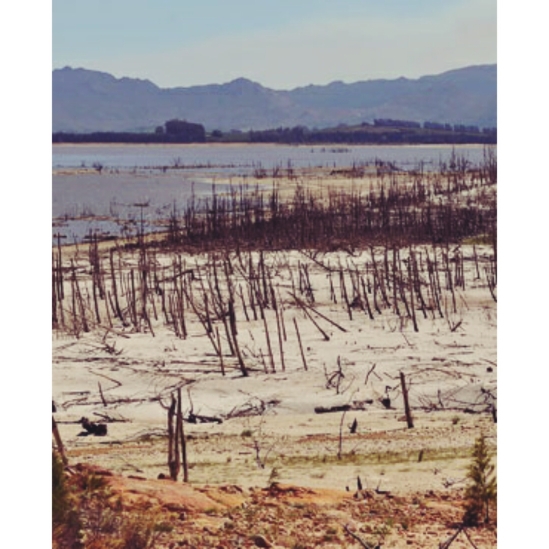The water crisis in Cape Town is a dire situation as there are only 79 days of useable water left. Our water resources will be exhausted by 30 June, as announced by News24.
Cape Town uses approximately 801 million litres of water per day, which is 101 million liters above the target of 700 million liters per day. It is not only large corporations that use exorbitant amounts of water. Many households are responsible for this high water usage – 20 000 homes use 50 kilolitres a month, according to Patricia de Lille, the mayor of Cape Town. These households will not go unpunished though. They face steep fines if they fail to reduce their consumption levels and warnings have been issued which affirms that their water usage will be cut to 350 litres per day.

Theewaterskloof dam, one of the biggest water suppliers in Cape Town, is close to empty. Photo: http://www.news24.com/SouthAfrica/News/emergency-measures-in-place-for-water-crisis-cape-town-20170313 Edited by: Lara Antonopoulos
Each individual can make a difference to save Cape Town by reducing their level of water consumption:
Adopting a vegetarian diet could be beneficial to Cape Town and aid in the attempt to save the city. The amount of water that goes to raising animals for food is astounding. The production of one pound of meat takes more than 2,400 gallons of water, whereas just 25 gallons of water is needed to grow 1 pound of wheat. Diets which depend on meat, therefore, place enormous pressure on the environment. Research claims that up to 24% more water will be needed to grow the world’s food in 20 years. It is simply not viable if one continues to live a meat-based life.
There are many other prudent ways in which people – meat eaters and vegetarians – can save water. Non-potable water (water that is not of drinking quality) can be utilized in many ways:
-
Individuals can shower with a bucket and recycle the grey water to use in the garden.
-
Vehicles can be washed with non-potable water.
-
Other little things which make a big difference include fixing a dripping tap and
-
Turning off the tap when you brush your teeth (because running the tap while brushing your teeth uses up to 20 litres of water!) or
-
Installing a water meter.
Attempts to manage water consumption will be put into effect, according to Xanthea Limberg – the mayoral committee member for water services – in an interview with Cape Argus. “… the city will intensify the restriction rules further and drop pressures to inhibit high consumption.” The installation of water management devices would assist households, businesses and other users to efficiently manage consumption. Level 3B water restrictions have been in effect since 1 February 2017 until further notice. The hyperlink explains what the restriction entails in more detail.
It may seem futile to fix a dripping tap – one might ask how that matters in the grand scheme of things, but it is important to remember that every drop counts. Overcoming the water crisis starts at home. In the end, saving water will not only help the water crisis in Cape Town, but it will also benefit the environment.
